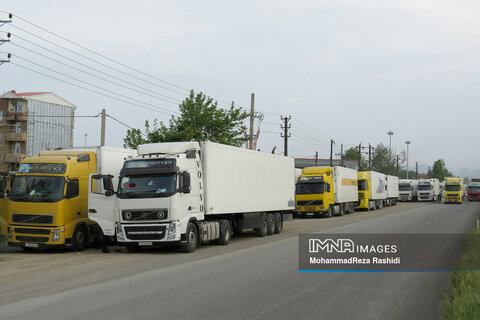Iran (IMNA) - Afandizadeh further elaborated that the transit of oil products via Iran witnessed a 7.42% rise, while the non-oil goods sector observed a commendable 6.3% growth in the six-month timeframe, year on year. These figures demonstrate a positive trend for Iran's transit industry.
The deputy transport minister had previously disclosed that in the past Iranian calendar year 1401 (which ended on March 20), a notable 10.8 million tons of commodities were transited through the country. Additionally, Iran achieved a new record high by successfully transiting 8.3 million tons of non-oil goods in 1401. Furthermore, 2.5 million tons of oil products were also efficiently transported via Iran in the previous year.
Afandizadeh emphasized, "When we compare the transit of 7.5 million tons of non-oil goods in 1400, we can observe a remarkable 10.7% growth in the transit of this category of goods in 1401 compared to the previous year." He further highlighted that in 1401, the country witnessed significant developments and achievements in both strategic and operational aspects of its transit sector, which are expected to gradually and consistently contribute to the growth of transit from Iran in 1402 and the subsequent years.
In a significant development, officials from Iran, Russia, and Azerbaijan convened in Baku last September to discuss the activation and enhancement of the North-South International Transport Corridor. During the meeting, the three countries aimed to achieve the transit of 15 million tons of goods through this corridor by 2030. Several agreements were reached to strengthen cooperation, promote joint investment and financing, develop crucial infrastructures, and facilitate cross-border traffic of goods. Notably, the construction of the Rasht-Astara railway line emerged as a key focus area.
Implementation of the agreements is currently underway, with all parties actively following up on progress. This initiative holds immense potential for facilitating trade and boosting both the quality and quantity of cross-border traffic in the region.
Another significant development in the past year was Iran's successful attainment of full membership in the Shanghai Cooperation Organization (SCO). Following the heads of Shanghai's meeting in Samarkand in September 1401, Tehran hosted the first six-party meeting of transport ministers from Iran, Central Asian countries, Russia, and Azerbaijan in October 1401.
The primary objective of this meeting was to establish an annual transit target of 20 million tons between Iran and Central Asian countries. Recognizing the pivotal role and importance of this region in east-west and north-south transit, especially in light of recent regional and international developments, the members of the SCO unanimously approved this objective.
These positive developments signify a new era of enhanced connectivity and economic cooperation among the participating nations, paving the way for increased trade and prosperity in the region.


Your Comment